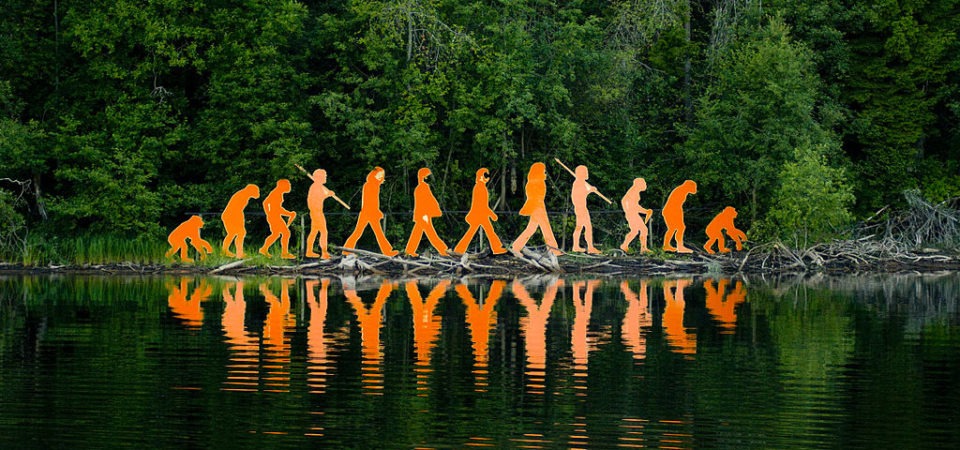This article was first published at The Great Transition Initiative on August 22, 2022
As climate change accelerates, and other symptoms of overshoot compete for the headlines, the world community finally seems willing to revisit “the population problem.” Congratulations to the GTI for encouraging the discussion and to Ian Lowe for his exceptionally wide-ranging and level-headed opening essay on the cultural roots and consequences of what amounts to population denial.
That said, one thing is curiously missing from Lowe’s and virtually every other article on the topic: an exploration of the bio-evolutionary dynamics of the population conundrum. This conceptual vacuum is characteristic of modern techno-industrial (MTI) culture’s allegiance to human exceptionalism. We do not consider ourselves to be mere animals beholden to the laws of nature.
Such reticence is pure social construct and is wholly unjustifiable. Ukrainian-American geneticist Theodosius Dobzhansky once famously argued that “nothing in biology makes sense except in the light of evolution.” Since Homo sapiens is an evolved species, and individual and group behaviors are, in part, heritable qualities shaped by natural selection, it is fair to assert that nothing in human affairs makes sense except in the light of evolution.
Consider just two adaptive behaviors that Homo sapiens shares with all other species. Humans have an innate propensity to consume available resources—often to depletion—and a parallel drive to invade and colonize all accessible habitats. (Even indigenous peoples seem to have reached harmonic equilibrium with their ecosystems only after depleting or exterminating readily harvested prey species.) Earth is to Homo sapiens as a nutrient-rich Petri dish is to colonizing bacteria. The difference is that humans are better than bacteria or any other species at expressing both survival strategies.
Indeed, our competitive superiority is continuously being upgraded by advancing technology: modern factory-freezer trawlers are more effective at depleting available resources than are indigenous river-mouth fish weirs; engineers are continually redefining the meaning of “available” in the petroleum and mineral-mining industries. Consider, too, how the financial sector exploits consumers’ yearning for material gratification. Depleted your paycheck? Not to worry! Human ingenuity has devised the humble credit card, a pseudo-resource that enables its possessors to consume well beyond their incomes.
Homo sapiens’s spatial conquest of Earth has also been finely tuned for at least 60 millennia. Humans have not only occupied all suitable habitats, but have also altered many hostile environments so that we can colonize these as well. It is a mark of evolutionary success that we have the most extensive geographic range of any vertebrate species (except perhaps for the rats and mice that follow us around). Does anyone think that if a new verdant continent were discovered, we would ignore it on grounds that we have destroyed everywhere else? Elon Musk and others of his Mars colonization ilk are simply playing out humanity’s expansionist bravado.
There is, of course, something deeper at play here. First, like all other species, human populations are capable of exponential growth under ecologically favorable conditions. Second, Homo sapiens has a highly successful reproductive strategy: we exhibit all the qualities of typical “K”-strategic species (“K” = carrying capacity). We are long-lived and highly competitive. We have a relatively low reproductive rate, exhibit extreme parental care, and enjoy relatively high off-spring survival rates. Thus, at every level of technological achievement, populations of Homo sapiens eventually press, often painfully, against local carrying capacities. Bluntly put, humans are potentially unsustainable by nature. This was Malthus’s great insight, now denied or forgotten.
“But wait,” some will protest. “Surely MTI society has ‘evolved’ beyond such primitive considerations!” Not at all—they perfectly describe the trap we have set for ourselves. Anatomically modern humans have been around for at least 200,000 years, but for 99.9% of this period, our numbers were held in check at local carrying capacities by natural negative feedback. Our population did not reach its first billion until the early 1800s; then, in just two centuries—1/1000th as much time—we ballooned to 7 billion (and will hit 8 billion in 2022). The Scientific and Industrial revolutions had finally freed the genie of exponential growth from its bottle. Improving population health contributed, but the human explosion was mostly made possible by fossil fuel (FF). Coal, oil, and natural gas provided the fuel by which MTI society could produce/acquire all the food, fiber, and mineral resources needed to grow the human enterprise.
But now we have a problem. It took massive quantities of extra-somatic energy to make modern society possible, and additional huge quantities are necessary even to maintain it in place. MTI society is suspended at height on a gusher of depletable petroleum and natural gas, and, as the pressure drops, society will likely descend in proportion. Every significant facet of modern society is deeply energy-dependent, and, despite the promotional hype, there are as yet no viable substitutes for most uses of fossil fuels. (According to the International Energy Agency, fossil fuels provide more than 80% of the world’s primary energy; modern renewables less than 3%. This is no doubt a major reason why the world community has taken so little action to curb fossil fuel use with its attendant carbon emission.)
Moreover, abundant cheap energy did not inflate our numbers by raising long-term carrying capacity, but rather by increasing the rate at which the human enterprise could pillage our finite planet. We are exploiting nature well beyond the ecosphere’s regenerative capacity, depleting cumulated stocks of “natural capital”—fish stocks, tropical forests, arable soils, groundwater, biodiversity, fossil fuels, etc., etc.—and polluting just about everything. (Even climate change is an excessive waste problem.) This is the very definition of ecological overshoot.
Not everyone is equally culpable. The wealthiest quarter of humanity alone has effectively appropriated most of the planet’s biocapacity. Egregious inequality is, however, a separate socio-political issue—population growth is currently the major contributor to worsening overshoot in all income quartiles. That said, there is a connection: the material footprints of upper-income consumers average ten to fifteen times larger than those of the denizens of low-income countries. It follows that the most ecologically significant per capita gain from population reduction would come from policies that accelerate the decline in the numbers of wealthy consumers. (Pity that most governments in high-income countries lament the onset and decline of their nations’ “peak population.”)
As matters stand, overshoot means that Earth cannot long sustain even the present population at average material standards. Even so, the MTI mindset ensures we will continue scouring the planet—our biological imperative is currently being reinforced by a similarly expansionist cultural narrative. Humans will scrape the bottom of the oil barrel and every other resource trove to which we can gain access in a desperate attempt to maintain the growth-based status quo.
Such intransigence risks disaster. When other species experience population booms during ecologically advantageous periods, the booms are invariably followed by busts: resources run out, and negative feedback kicks in to restore balance. There is no reason to think human population dynamics are any different. For far too long, the world community has avoided confronting both excess consumption and population growth. Climate change inaction and blindness to overpopulation are two heads of the same hydra of deep cultural denial. All signs are that Homo sapiens is nearing the peak of the boom phase in a one-off global population cycle and that bust will follow. While rapid, determined collective action may yet limit the pain (especially to the poor and powerless), the world community has little chance of avoiding a major population correction in this century. A glance at the daily newsfeeds suggests that the Four Horsemen are already saddling up.
 William Rees is a professor at the University of British Columbia’s School of Community and Regional Planning (SCARP). He founded SCARP’s Environment and Resource Planning concentration and served as director from 1994 to 1999. His research focuses on the public policy and planning implications of global environmental trends and the necessary ecological conditions for sustainable socioeconomic development, and he is best known as the originator of “ecological footprint analysis.” He is also a founding member and former president of the Canadian Society for Ecological Economics; a co-investigator in the Global Integrity Project, aimed at defining the ecological and political requirements for biodiversity preservation; a Fellow of the Post-Carbon Institute; and a Founding Fellow of the One Earth Initiative.
William Rees is a professor at the University of British Columbia’s School of Community and Regional Planning (SCARP). He founded SCARP’s Environment and Resource Planning concentration and served as director from 1994 to 1999. His research focuses on the public policy and planning implications of global environmental trends and the necessary ecological conditions for sustainable socioeconomic development, and he is best known as the originator of “ecological footprint analysis.” He is also a founding member and former president of the Canadian Society for Ecological Economics; a co-investigator in the Global Integrity Project, aimed at defining the ecological and political requirements for biodiversity preservation; a Fellow of the Post-Carbon Institute; and a Founding Fellow of the One Earth Initiative.
The MAHB Blog is a venture of the Millennium Alliance for Humanity and the Biosphere. Questions should be directed to joan@mahbonline.org

